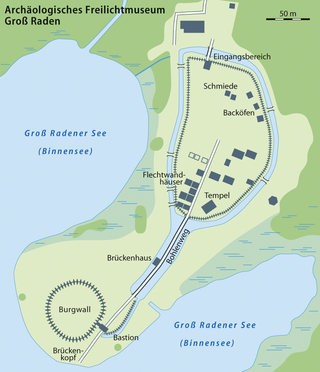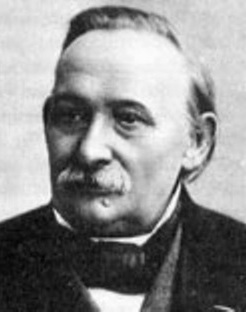Related Research Articles
Ulrich Willerding is a professor emeritus of botany at the Göttingen University, Germany. He is also an instructor at a local high school. Willerding is one of the leading European palaeo-ethnobotanists. He has specialized in Medieval Europe but also done work on other times. One of his special interests is weeds. He has worked on bibliographies of European paleoethnobotany. Although a biologist by training, he has worked extensively with archaeologists.

Republikflucht was the colloquial term in the German Democratic Republic for illegal emigration to West Germany, West Berlin, and non-Warsaw Pact countries; the official term was Ungesetzlicher Grenzübertritt. Republikflucht applied to both the 3.5 million Germans who migrated legally from the Soviet occupation zone and East Germany before the Berlin Wall was built on 13 August 1961, and the thousands who migrated illegally across the Iron Curtain until 23 December 1989. It has been estimated that 30,000 people left the GDR per year between 1984 and 1988, and up to 300,000 per year before the construction of the Berlin Wall in 1961.
Ernst Wahle was a German archaeologist.

The Treaty of Templin was concluded on 24/25 November 1317, ending a war between the Margraviate of Brandenburg and Denmark, the latter leading a North German alliance. During this war, Brandenburgian margrave Waldemar and his troops were decisively defeated in the 1316 Battle of Gransee, fought at Schulzendorf between Rheinsberg and Gransee. After the battle, Brandenburg was forced to negotiate a truce. The treaty of Templin was signed a year later by Danish king Erich VI Menved, his ally duke Henry II of Mecklenburg, and Waldemar.

Hilde Benjamin was an East German judge and Minister of Justice of the German Democratic Republic. She is most notorious for presiding over the East German show trials of the 1950s, which drew comparisons to the Nazi Party's Volksgericht show trials under Judge Roland Freisler. Hilde Benjamin is particularly known for being responsible for the politically motivated prosecution of Erna Dorn and Ernst Jennrich. In his 1994 inauguration speech German President Roman Herzog cited Hilde Benjamin as a symbol of totalitarianism and injustice, and called both her name and legacy incompatible with the German Constitution and with the rule of law.
The Gustow group is an archaeological culture of the Roman Iron Age in Western Pomerania. The Gustow group is associated with the Germanic tribe of the Rugii.
Bernhard Fisch was a German writer.
The Deutsche Gesellschaft für Ur- und Frühgeschichte e.V. (DGUF) – the German Society for Pre- and Protohistory – has more than 700 members and is thus the largest German association active in the field of prehistory and the early historical period. Its members are not only archaeology professionals but also private citizens interested in the subject. Known informally by its acronym, DGUF, it is the only nationwide archaeological association that also allows individual personal membership.

The Groß Raden Archaeological Open Air Museum lies a few kilometres north of the small town of Sternberg and about a kilometre northeast of the village of Groß Raden in the German state of Mecklenburg-Vorpommern. The site is in a depression that borders directly onto the lake of Radener See. On a peninsula in front of that lies its circular castle rampart, visible from afar, which has a diameter of 50 metres. From 1973 to 1980 extensive excavations were carried out here, led by Ewald Schuldt, during the course of which the remnants of a Slavic settlement dating to the 9th and 10th centuries was unearthed. The fort has been reconstructed based on the excavations and established as an archaeological open-air museum. It has been enhanced by finds from the Slavic castle of Behren-Lübchin.
Horst Wolfgang Böhme is a German archaeologist with a focus on Late Antiquity / Early Middle Ages and research into castles.
Ilko-Sascha Kowalczuk is a German historian and author. His work is focused on the German Democratic Republic and its Ministry for State Security.
Andreas Herbst is a German historian. His career has been divided between authorship and museum work. He has written extensively on aspects of the German Democratic Republic and since 2001 has worked for the German Resistance Memorial Center in Berlin.
Horst Bartel was a German historian and university professor. He was involved in most of the core historiography projects undertaken in the German Democratic Republic (1949–1989). His work on the nineteenth-century German Labour movement places him firmly in the mainstream tradition of Marxist–Leninist historical interpretation.

Franz Theodor Magnus Böhme was a German academic, musicologist, composer, folksong collector and writer on music history and folksong.

Rudolf Emil Mell was a German zoologist and entomologist who specialised in Lepidoptera especially Sphingidae and the fauna of China. He was the director of the German-Chinese Middle School at Canton (Guangzhou) for some time. His collection of Sphingidae is held by the Carnegie Museum of Natural History in Pittsburgh. It was purchased by Benjamin Preston Clark.
Hans-Christof Kraus is a German historian.
Edgar Hartwig is an East German historian. In the GDR he taught scientific socialism at the Hochschule für Musik Franz Liszt, Weimar until 1989 and, within the framework of the "Arbeitsgruppe zur Geschichte der bürgerlichen Parteien" at the Friedrich-Schiller-Universität Jena, he presented the history of the Pan-German League and the German Agrarian League.
Fritz Reuter was a German musicologist, music educator, composer and Kapellmeister. Reuter was one of the most important German music educators of the 20th century. After studying music and musicology in Dresden and Leipzig, with Teichmüller, Riemann, Schering and Abert, he received his doctorate in 1922. In 1945, he was appointed Kapellmeister at the Volksoper in Dresden. In 1949, he was appointed as the first professor of music education at a German university. He was also director of institutes at the Martin Luther University of Halle-Wittenberg and the Humboldt University Berlin. In 1955, he was one of the initiators of the first Hallische Musiktage.
Rudolf Kötzschke was a German historian who founded the Seminar for Regional History and Settlement Studies in Leipzig, the first regional history institution at a German university.

Inner German relations, also known as the FRG-GDR relations, East Germany-West Germanyrelations or German-German relations, were the political, diplomatic, economic, cultural and personal contacts between the Federal Republic of Germany and the German Democratic Republic, at the period of the West-East division in German history from the founding of East Germany on 7 October 1949 to Germany's reunification on 3 October 1990.
References
- Lexikon der DDR-Historiker. Biographien und Bibliographien zu den Geschichtswissenschaftlern aus der Deutschen Demokratischen Republik. Saur, München 2006, ISBN 3-598-11673-X, P. 126.
- "Benecke, Norbert". www.deutsche-biographie.de (in German). Deutsche Biographie . Retrieved 29 January 2024.